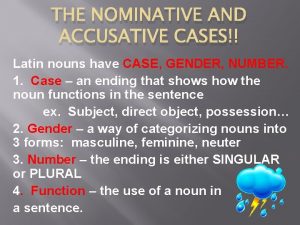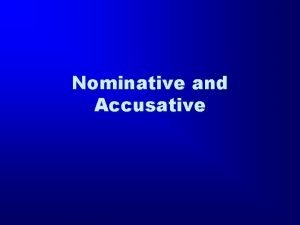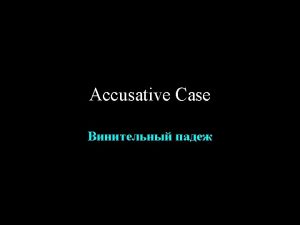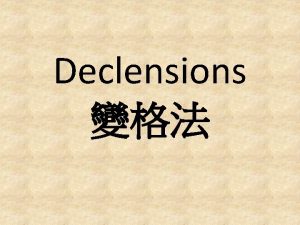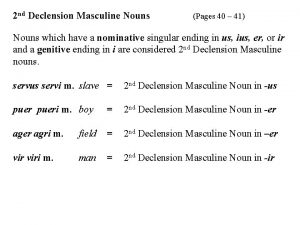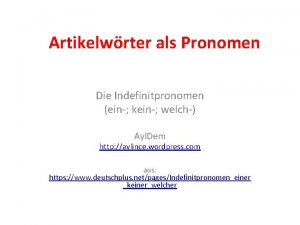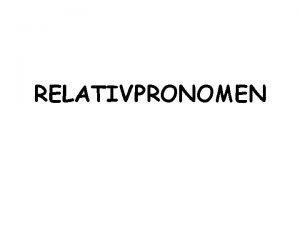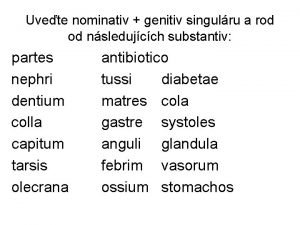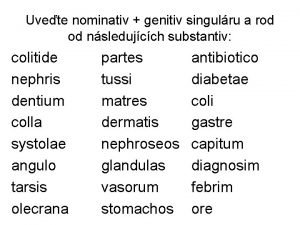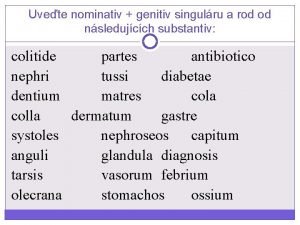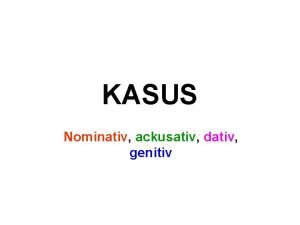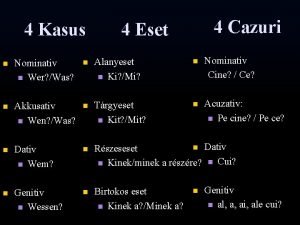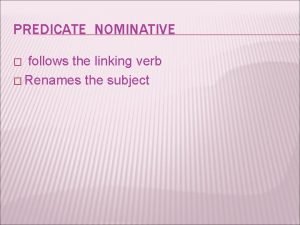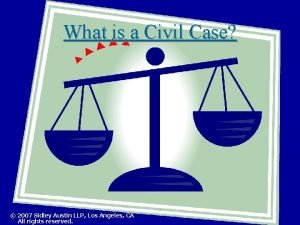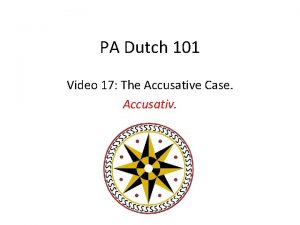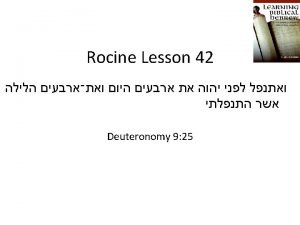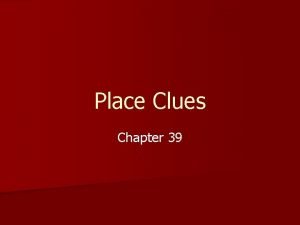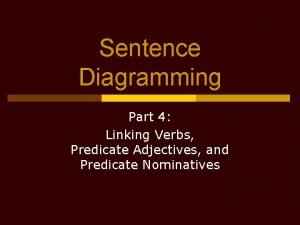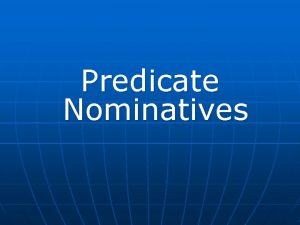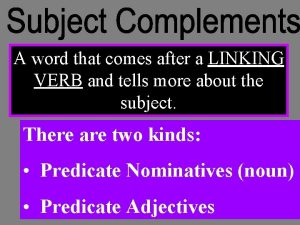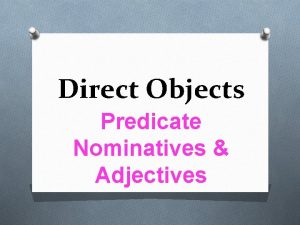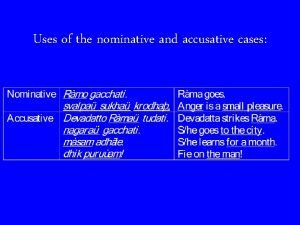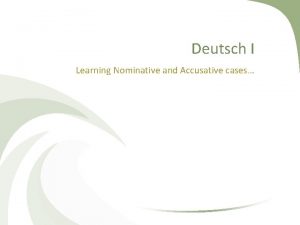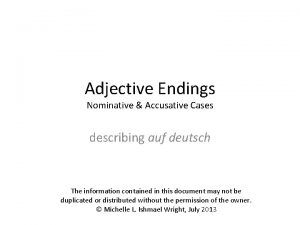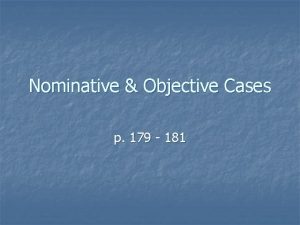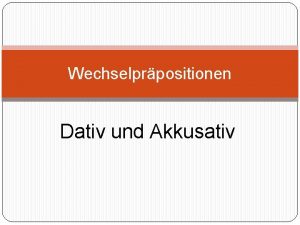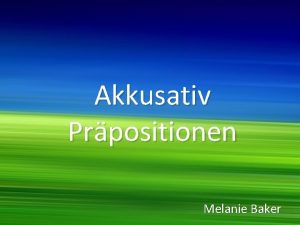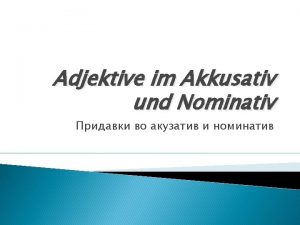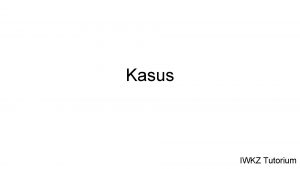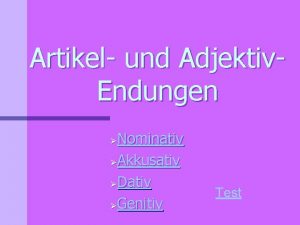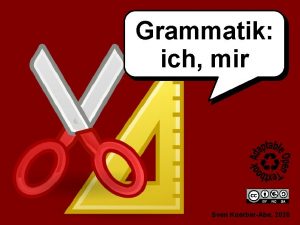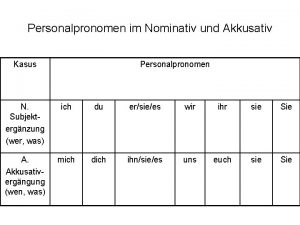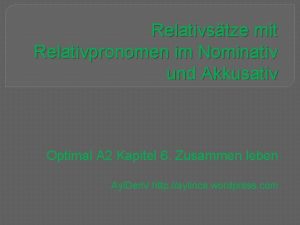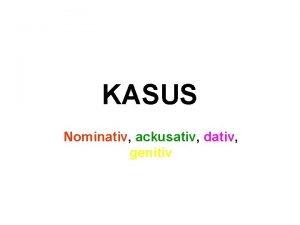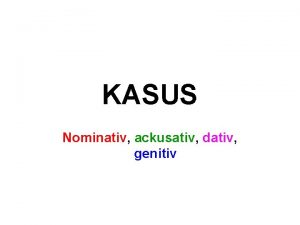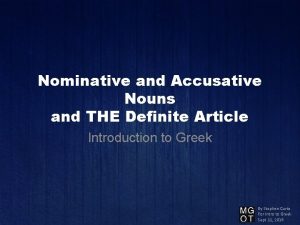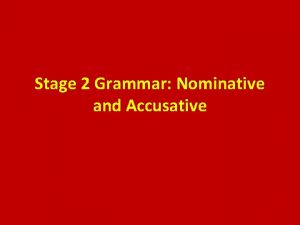Akkusativ The Nominative and Accusative Cases Nominativ German



























- Slides: 27

Akkusativ The Nominative and Accusative Cases

Nominativ • German uses different cases to show the grammatical function of nouns in a sentence. • So far we’ve only been working with the Nominative Case…

Nominativ • So when do we use the Nominative Case? • The Nominative Case is used for the subject of the sentence. • The subject is the person or thing that does the action in the sentence.

Nominativ • We play guitar. Wir spielen Gitarre. • Anja and Helga dance. Anja und Helga tanzen. • The boys listen to music. Die Jungen hören Musik.

Akkusativ • There’s also the Accusative Case. • The Accusative Case is used for the direct object of the sentence. • The direct object is the person or thing receiving the action of the verb.

Akkusativ • We play guitar. Wir spielen Gitarre. • They throw the ball. Sie werfen den Ball. • I have a pencil. Ich habe einen Bleistift.

Übung A • In the sentences below, circle the subject and underline the direct object. • Passt auf! Some sentences will not have a direct object! • Zum Beispiel: • The boy has the eraser.

Übung A • I would like the computer. • She plays the guitar. • Mr. Schumann buys the cat and the dog. • School starts at 7: 25 a. m.

Übung A • She likes to dance. • Andrea and Jürgen need the pen. • We are playing the computer game. • I’m reading the book.

Übung A • You have the tv at home. • Anja and Christiane have the ruler and the notebook. • The parents don’t know the teacher (male).

Übung A • I don’t have the clock. • Thomas is reading the book. • Michael is new here. • There are five children around the corner.

Übung A • The girl knows the family. • My sister plays the piano. Do you hear the music? • Tomorrow he’s buying the computer.

Übung A • You would like the CD and the DVD. • We don’t need the eraser, we need the pencil sharpener.

Nominativ und Akkusativ • In German, the articles (der/die/das) change depending on the gender and case of the noun. • This means that the same word may have a different article (der/die/das) if it’s in the Nominative Case or the Accusative Case.

Artikel Masculine Neuter Feminine Plural Nom. der das die Accus. den das die

Verben • There are several German verbs that are often followed by the Accusative. Being able to recognize these verbs will help you as learn about Direct Objects. Make sure you know these verbs! • Passt auf! Just because these verbs often have a direct object, doesn’t mean they don’t have a subject too! There’s always a subject!

Verben • haben to have • holen to get • spielen to play • hören to hear • möchte would like • kaufen to buy • kennen to know • brauchen to need • sehen to see

Es gibt • Another very important expression to know is Es gibt. • Es gibt = there is / there are • This expression is always followed by the Accusative Case.

Sein • One important thing to remember… • The verb sein (to be) is never followed by the Accusative Case. Er ist ein Junge. Er ist mein Freund. Der Bruder ist ein Schüler.

Übung B • Translate the sentences above into German. • Zum Beispiel: • • The boy has the eraser. Der Junge hat den Bleitsift.

Übung B • I would like the computer. Ich möchte den Computer. • She plays the guitar. Sie spielt die Gitarre. • Mr. Schumann buys the cat and the dog. Herr Schumann kauft die Katze und den Hund. • School starts at 7: 25 a. m. Die Schule beginnt um 7 Uhr 25.

Übung B • She likes to dance. Sie tanzt gern. • Andrea and Jürgen need the pen. Andrea und Jürgen brauchen den Kuli. • We are playing the computer game. Wir spielen das Computerspiel. • I’m reading the book. Ich lese das Buch.

Übung B • You have the tv at home. Du hast den Fernseher zu Hause. • Anja and Christiane have the ruler and the notebook. Anja und Christiane haben das Lineal und das Heft. • The parents don’t know the teacher (male). Die Eltern kennen den Lehrer nicht.

Übung B • I don’t have the clock. Ich habe die Uhr nicht. • Thomas is reading the book. Thomas liest das Buch. • Michael is new here. Michael ist neu hier. • There are five children around the corner. Es gibt fünf Kinder um die Ecke.

Übung B • The girl knows the family. Das Mädchen kennt die Familie. • My sister plays the piano. Do you hear the music? Meine Schwester spielt das Klavier. Hörst du die Musik? • Tomorrow he’s buying the computer. Morgen kauft er den Computer.

Übung B • You would like the CD and the DVD. Du möchtest die CD und die DVD. • We don’t need the eraser, we need the pencil sharpener. Wir brauchen den Radiergummi nicht, wir brauchen den Anspitzer.

 Latin nominative and accusative
Latin nominative and accusative Cei
Cei Nominative genitive dative accusative
Nominative genitive dative accusative Dative accusative nominative genitive table
Dative accusative nominative genitive table Nominative genitive dative accusative ablative
Nominative genitive dative accusative ablative Einer eine eins welche
Einer eine eins welche Gut genitiv
Gut genitiv Relativpronomen im nominativ und akkusativ
Relativpronomen im nominativ und akkusativ Akkusativ nominativ dativ table
Akkusativ nominativ dativ table Singulru
Singulru Nominativ akkusativ dativ explained
Nominativ akkusativ dativ explained Relativpronomen im genitiv
Relativpronomen im genitiv Nominativ akkusativ dativ
Nominativ akkusativ dativ Nominativ genetiv
Nominativ genetiv Nominativ akkusativ
Nominativ akkusativ Follows a linking verb and renames the subject
Follows a linking verb and renames the subject Criminal cases vs civil cases
Criminal cases vs civil cases Low german vs high german
Low german vs high german Accusative case
Accusative case Hitpael
Hitpael Accusative infinitive
Accusative infinitive Accusative place to which
Accusative place to which Accusative in russian
Accusative in russian Predicate nominative examples
Predicate nominative examples Predicate nominative noun clause
Predicate nominative noun clause Diagram linking verbs
Diagram linking verbs Predicate nominative
Predicate nominative Subject and predicate example
Subject and predicate example
